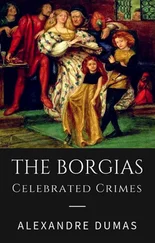Meanwhile, the main body of King Charles’s army entered Rome at about three o’clock in the afternoon of the last day of December. Alexander VI and his family took shelter in Castel Sant’Angelo, while Giulia Farnese was spirited out of the city by her brother, Cardinal Alessandro Farnese. These precautions proved unnecessary. ‘Twice our great guns were ready to fire on Castel Sant’Angelo,’ wrote Philippe de Commynes, ‘but on both occasions the King opposed it.’
It took six hours for the French army to file through the gate at Santa Maria del Popolo, and it was long after darkness had fallen that the last stragglers entered the city. By flickering torchlight and the gleam of lanterns, the men and horses marched though the narrow streets, muddy and wet in the pouring rain: Swiss and German infantry carrying broadswords and long lances, Gascon archers, French knights, Scots archers, artillerymen with bronze cannons and culverins. Escorted by cardinals Ascanio Sforza and Giuliano della Rovere, and surrounded by his bodyguard and his magnificently dressed courtiers, rode Charles VIII himself, a short, ugly young man with a huge hooked nose and thick fleshy lips, constantly open.
‘There were fires, torches and lights in every house,’ Burchard recorded, ‘and people were heard shouting “France! France!” and “Vincoli! Vincoli!”’ continually (San Pietro in Vincoli was the title of Cardinal Giuliano della Rovere). At the Palazzo Venezia, the great palace built by Paul II at the foot of the Capitol Hill and now the residence of Cardinal Lorenzo Cibò, the king dismounted and was ushered inside by his host. He limped into the dining room and sat by the fire in his slippers, while a servant combed his hair and the wispy scattered strands of his reddish beard. Food was placed upon a table; a chamberlain tasted every dish before the king ate, and the remains were thrown into a silver ewer. Four physicians likewise tested the wine into which the chamberlain dangled a unicorn’s horn on a golden chain before His Majesty raised the cup to his lips.
Cardinal Cibò had prepared his best apartments ‘for housing the ambassadors and other Frenchmen,’ commented Burchard, adding that the dignitaries ‘were provided with plenty of straw beds, but I noticed that these sacks of straw were never cleaned; tallow candles hung from the doors and fireplaces, and, even though the walls were decorated with beautiful tapestries, the place resembled a pigsty.’
Despite Charles VIII’s protestations that his troops would respect the Romans and their property, they did cause a lot of trouble. Burchard reported that ‘on their way into the city the French troops forced an entrance into houses on either side of the road, throwing out their owners, horses and other goods, setting fire to wooden articles and eating and drinking whatever they found without paying anything.’ On Thursday, January 8, he recorded, ‘the house of Paolo Branco, a Roman citizen, was plundered and ransacked by the French who killed his two sons, whilst others, including Jews, were murdered and their houses pillaged; even the house of Donna Vannozza Catanei, the mother of Cardinal Cesare Borgia, did not escape.’
Even poor old Burchard himself was to suffer at the hands of the unruly soldiers: ‘When I returned to my house after mass, I found that the French had entered it against my will,’ he wailed. ‘They had taken out seven of the eight horses, mules and asses that I had in my stable and had billeted in their place seven of their own mounts which were busily eating my hay.’ His rooms, as well as those of his servants, had all been requisitioned by French nobles and their retinues. Eventually Charles VIII was forced to issue an order forbidding his troops from forcibly entering houses on pain of death.
While Alexander VI played a waiting game from the comfort and security of his apartments in Castel Sant’Angelo, where he was ensconced with Cesare and several of the Neapolitan cardinals, Charles VIII spent his time receiving visits from various cardinals and dealing with the deluge of complaints about his troops. One day, escorted by a company of soldiers, he was conducted on a tour of Rome to view the sights of the city: on another he rode out to the Basilica of San Sebastiano with his household.
It was not until January 16 that the two rulers finally came face-to-face. That day Charles VIII rode across Rome to St Peter’s, where he heard Mass in the French royal chapel, which had been restored by his father, Louis XI, and was dedicated to St Petronilla, the daughter of the first pope. ‘If my memory is correct,’ recorded Burchard, ‘the mass was not sung.’ The king was then escorted to the papal palace, where the lavish rooms of Alexander VI’s apartments had been prepared for him and his suite to dine. The pope, meanwhile, was on his way from Castel Sant’Angelo to the Vatican in his ceremonial litter. The ambitious twenty-four-year-old monarch, described by Guicciardini as ‘not particularly intelligent with regard to political affairs and carried away by his fervent wish to rule and his thirst for glory,’ was about to be outwitted by the wily pope.
‘On being told of His Holiness’s approach,’ wrote Burchard, the eager young king, not well versed in the subtleties of achieving diplomatic advantage, ‘hurried to the end of the second private garden to greet him.’ Catching sight of the pope, he approached him and twice genuflected before him: ‘At first His Holiness pretended not to see this gesture but when His Majesty came closer and was about to genuflect for a third time, the Pope removed his cap and, holding out his hand to restrain the King from kneeling, kissed him.’
Alexander VI’s informality was calculated, as was his apparent insistence on the equality that was seen to exist between the two rulers. ‘At this their first meeting,’ Burchard continued, ‘both men were bareheaded and the King kissed neither the Pope’s foot nor his hand. His Holiness refused to place his cap back on his head until the King had replaced his own hat, but eventually they both covered their heads simultaneously.’ Later that day Alexander VI displayed a similar deference when, having accompanied Charles VIII to the Sala del Pappagallo, he declined to sit down until his guest had done so.
Alexander VI also acceded to Charles VIII’s request to give a cardinal’s hat to Guillaume Briçonnet, the bishop of St-Malo and a trusted member of the king’s Privy Council, and to invest him immediately. Burchard was sent off forthwith to find a cardinal’s hat and robe. ‘The hat was supplied by Cardinal Cesare Borgia,’ he remarked, ‘and the cloak was borrowed from the rooms of Cardinal Pallavicini.’ All the cardinals present were now seated as if for a consistory, and Alexander VI, according to Burchard, ‘said he was happy to agree to the King’s request providing the cardinals also considered the occasion suitable.’
One by one the cardinals gave their consent, and the pope duly invested Briçonnet with the insignia of his new rank. ‘When this had been done the Cardinal of St-Malo kissed the Pope’s foot and hand, and then, raised up by the Pope, he received the kiss on the mouth,’ not just from Alexander VI but also from all the other cardinals present.
Alexander VI himself now rose from his seat and said that he wished to escort the king back to the royal apartments, but this Charles VIII ‘categorically refused to allow.’ He was therefore accompanied by the cardinals as far as the entrance, where they left him. The doors were guarded by Scottish mercenaries, who had the special duty of guarding the French king and allowed none to enter except for members of the royal household.
Two days later, on January 18, having managed neatly to side-step two of Charles VIII’s demands — the calling of a council to address the issue of the reform of the church and papal recognition of his claim to Naples — Alexander VI did give him formal permission to pass freely through the Papal States, a somewhat Pyrrhic victory for the young king, who already held most of the territory north of Rome and knew that the pope did not have the forces necessary to prevent him from taking the rest, if he wanted it. In return, the pope had extracted a promise from Charles VIII that he would profess his obedience to the pope in public.
Читать дальше











